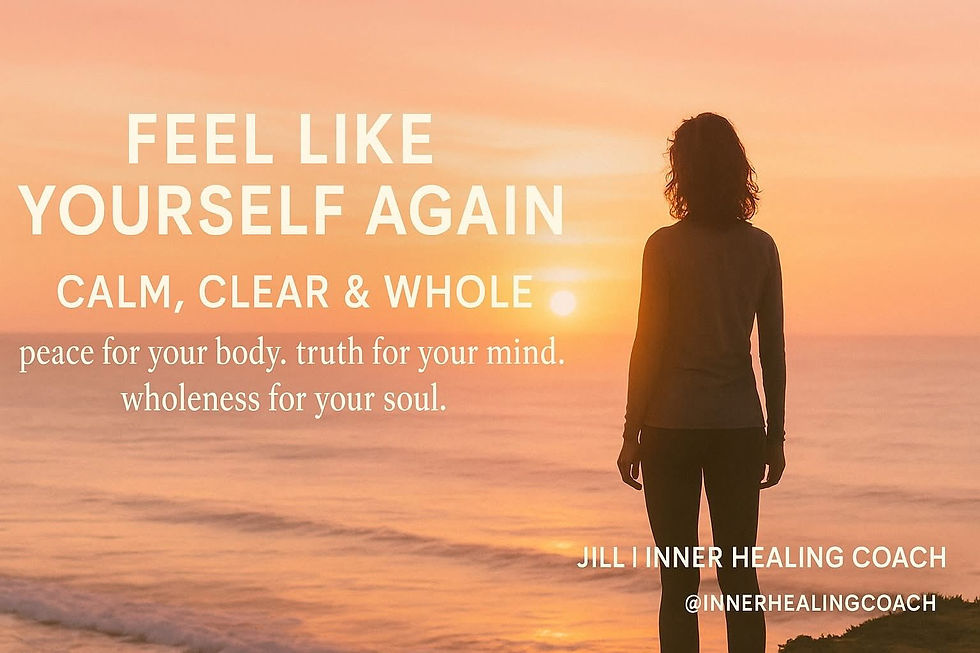Attachment Styles Are Not Fixed — And That’s Good News for Healing
- JILL | INNER HEALING COACH
.png/v1/fill/w_320,h_320/file.jpg)
- Aug 6, 2025
- 3 min read
When I first began learning about attachment styles, it felt like I was reading my emotional autobiography. Every article seemed to define me with eerie accuracy. Anxious. Avoidant. Disorganized. At different points in my life — especially after my divorce — I’ve lived through each one of them.

But here’s the truth: attachment styles are not fixed, and that’s one of the most important things I’ve learned, both as a trauma-informed coach and a woman on her own healing journey.
1️⃣ Why Attachment Styles Can Change
Most people think attachment styles are permanent — like eye color or height. But in reality, they’re much more fluid and responsive. While our early relationships (especially with caregivers) shape the foundation, our current experiences and relationships can reinforce or reshape that attachment style.
When I was married, I found myself becoming anxiously attached — always walking on eggshells, doubting my worth, questioning whether love would stay. After my divorce, I swung the other direction, building thick emotional walls, determined not to need anyone. I wasn't broken. I was adapting.
Healing, therapy, trauma-informed support, and the presence of safe people helped me shift again — this time, toward a more secure style. But it didn’t happen overnight. It was a process of learning to trust again, not just others, but myself and God.
2️⃣ Attachment Styles Can Vary in Different Relationships
Another powerful truth: your attachment style isn’t the same with everyone.
I’ve felt secure with close, consistent friends and mentors — people who showed up, spoke truth, and made me feel emotionally safe. I’ve felt anxious in romantic relationships where affection was inconsistent, or where words didn’t match actions. I’ve felt avoidant around colleagues who crossed boundaries or tried to control.
This is important because it breaks the myth that you’re just one type of person. You’re not “an anxious person” or “an avoidant woman.” You’re a human being responding to your environment.
👉 Attachment is adaptive, not a fixed flaw. It’s about how safe you feel in a given relationship — and how your nervous system responds when that safety is threatened or honored.
3️⃣ What This Means in Practice
As a trauma-informed woman — and someone healing after heartbreak — I’ve learned this:
Don’t label yourself or others as “always anxious” or “always avoidant.” That keeps people boxed in instead of recognizing their capacity for growth.
Trust can grow. Safety can deepen. We can move toward secure attachment with the right support, consistency, and care.
Be gentle with yourself. If your attachment wounds flare up with certain people, it doesn’t mean you’re broken. It means something inside you is alerting you to a mismatch between your need for safety and the reality you’re experiencing.
I’ve seen this firsthand in my own life. My nervous system responds differently depending on how emotionally safe I feel with someone. If their actions don’t align with their words, I feel anxious — not because I’m needy, but because that inconsistency triggers my past trauma. If they communicate with clarity and care, I can lean into the relationship more securely.
So, What Does This Mean for You?
Understanding that attachment styles can shift brings hope. It means you’re not stuck. You’re not doomed to replay the same patterns forever.
➡️ It also means you can offer yourself and others more compassion.
➡️ You can stop labeling yourself as "broken" or "too much."
➡️ You can recognize when someone else's behavior is triggering old wounds — and learn to respond with clarity and healthy boundaries.
Ask yourself: How might understanding the fluidity of attachment styles shape the way you support yourself, your loved ones, or your co-workers?
The more you learn to honor your nervous system, the more you’ll recognize attachment isn’t about weakness. It’s about safety.
And the more securely you feel rooted in truth, the easier it becomes to cultivate healthy, lasting connections — ones that mirror God’s love: consistent, kind, and never manipulative.

Ready to learn more and heal deeply?
Explore these powerful, faith-rooted resources:
📘 Your Brain is Speaking: Truth About Trauma – How to Regulate Your Mind & Body
💛 What Stress & Trauma Do to Your Body
📖 Healthy Happy Habits eBook – for a nervous system and mindset reset
❤️ Redeeming Your Love Dating Guide – for secure, God-honoring relationships
👉 Shop now: www.innerhealingcoaching.com/shop-1
You’re not alone, and you are not broken—you are becoming. And God is not done writing your love story. Not even close.
– Jill | INNER HEALING COACH
@innerhealingcoach
Helping women reclaim their worth, restore their voice, and walk in healing.




Comments